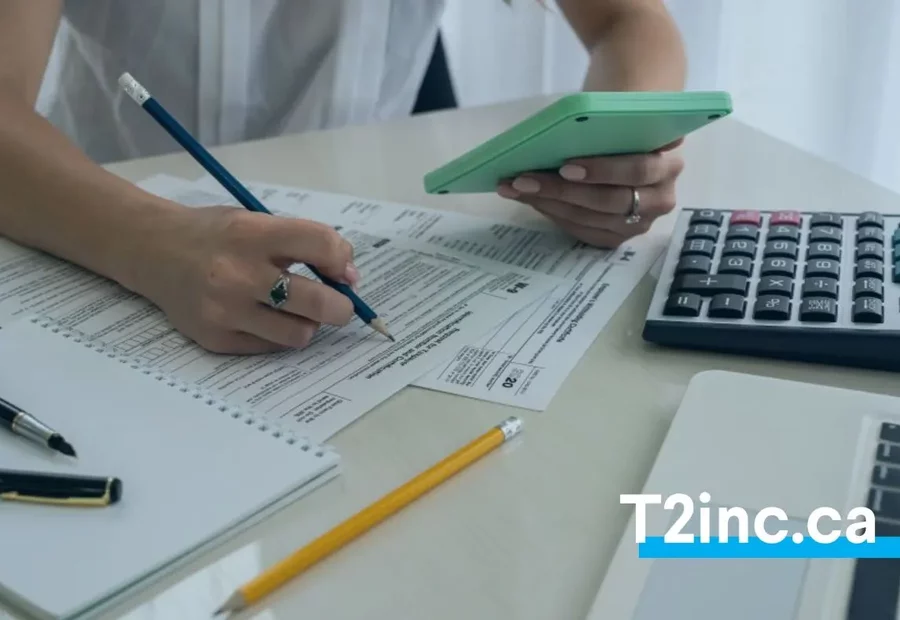How to file business taxes online for small businesses

Every year, thousands of Canadian entrepreneurs face the same challenge: how to file business taxes efficiently? Between T2 forms, Quebec CO-17 returns for liable companies, and new digital filing requirements, preparing corporate tax returns can quickly become overwhelming.
This comprehensive guide explains how to file corporate taxes in compliance with the new 2024 obligations. Discover the various solutions available, their pros and cons, plus essential steps to avoid costly mistakes and optimize your small business taxation across Quebec and Canada.
The mandatory requirement to file business tax returns online
Since January 1, 2024, ALL incorporated companies in Canada are required to file their tax submissions electronically, regardless of their revenue level. This obligation stems from Bill C-47, which eliminated the previous $1 million gross income threshold.
In practical terms, this means your corporation must e-file corporate taxes whether you generate $10,000 or $10 million annually. The tax act now mandates digital transmission for all types of business structures, making electronic filing the only accepted method.
Failure to comply with this requirement exposes your company to significant tax penalties that can quickly accumulate:
- Late filing penalty: up to $1,000 per month;
- Compound interest on amounts owed;
- Complications with GST/HST and other tax credits.
The financial impact can be particularly devastating for Quebec SMEs. Beyond direct penalties, administrative complications generate considerable indirect costs: lost time, stress, and resources diverted from your core business activities. A simple procedural error can trigger a domino effect that disrupts your tax management for months.
Available solutions for online business tax filing
Faced with this universal obligation, every taxpayer must choose the solution that matches their needs and budget. Here are the three main filing options to file business taxes online:
1. Certified commercial tax software
Tax software like TaxCycle, ProFile, or Intuit ProConnect are certified by the CRA for electronic transmission. These solutions allow you to:
- File and transmit directly to CRA and Revenu Québec;
- Synchronize your accounting data;
- Automatically calculate your tax provisions;
- Receive immediate confirmation of receipt.
These CRA-certified software solutions offer guaranteed official transmission, advanced features for Canadian and Quebec SME taxation at affordable costs ($150 to $400 per return). However, they may require a significant learning curve and lack professional tax support for complex questions.
2. Government platforms (limited use)
The Canada Revenue Agency (CRA) and Revenu Québec offer online services for specific situations. However, these platforms don't allow complete T2/CO-17 return preparation but rather submission of your returns to tax authorities.
CRA and Revenu Québec online services allow you to:
- Access basic forms for free;
- Check your tax file status;
- Make certain minor amendments.
These government platforms are free and officially recognized. Nevertheless, their functionality remains very limited and unsuitable for complex returns of most incorporated businesses.
3. Online tax professional services
Specialized tax accounting firms, like T2inc.ca, use certified software and combine professional expertise with digital convenience to meet electronic filing obligations. Working with a tax expert ensures compliance while maximizing your savings. At T2inc.ca, our solution allows you to:
- Benefit from complete professional review;
- Maximize your legal tax savings;
- Automatically comply with electronic filing requirements;
- Obtain personalized support adapted to your situation;
- Avoid costly errors and penalties.
This option combines professional expertise with digital convenience to guarantee compliance. While fees exceed purely software solutions, this difference is generally offset by identified tax savings and elimination of error risks that can be very costly for SMEs.
T2inc.ca VS. competitors comparison
| Criteria | T2inc.ca | Certified Software | Traditional Accountants |
|---|---|---|---|
| T2 + CO-17 Price | $199-1,000 | $200-500 | $1,000-2,000 |
| Online Filing Compliance | ✅ 100% Guaranteed | ✅ Certified Software | ✅ Varies by firm |
| Expert Tax Support | ✅ Dedicated CPAs | ❌ Self-support | ✅ Subject to availability |
| Tax Optimization | ✅ Included based on info provided | ❌ Basic | ✅ Subject to availability |
| Processing Time | 3-5 business days | Immediate (DIY) | 2-6 weeks |
| Professional Review | ✅ Systematic | ❌ None | ✅ Standard |
| Electronic Filing | ✅ Included via certified software | ✅ Direct | ✅ Firm software |
| Compliance Guarantee | ✅ Professional insurance | ❌ User responsibility | ✅ Professional insurance |
| Availability | 24/7 online | Limited licenses | Appointments required |
| Post-filing Support | ✅ Separate billing | ❌ None | ✅ Separate billing |
Step-by-step guide to file your t2 corporate tax return
Follow this proven method to file your corporate income tax without errors and on time.
Step 1: Prepare your focuments
Proper preparation prevents 80% of problems when filing your T2 return online. This step also helps identify all available deductions.
Mandatory financial documents:
- Year-end financial statements (balance sheet, income statement);
- General ledger;
- Trial balances;
- Bank reconciliations;
- Fixed asset register.
Supporting documents:
- Invoices for all deductible business expenses;
- T4 and T5 slips issued;
- GST/HST collected and paid statements;
- Lease, insurance, and financing contracts;
- Proof of installment payments.
Situation-specific documents:
- Share certificates for new shareholders;
- Shareholder loan agreements;
- Subcontracting invoices (>$500);
- Corporate charitable donation receipts.
Step 2: Choose your method
Since the electronic filing obligation for incorporated businesses, your choice is limited to solutions using CRA-certified software.
For simple businesses (<$250K revenue):
- Online tax service recommended;
- Optimal value with included expertise.
For complex businesses (>$250K revenue):
- Specialized CPA recommended;
- Advanced tax optimization strategies necessary.
For inactive businesses:
- Simple online service or certified software;
- Standardized return, but electronic filing mandatory.
To help define the most suitable solution for your situation, here are essential decision criteria:
- Does the provider use CRA-certified software?
- What's the complexity of your operations?
- Do you have access to tax expertise?
- What's your overall budget for filing and optimization?
Step 3: Complete your return
This step represents the core of the tax process and directly determines your return's accuracy and final tax burden. Unlike simple data entry, properly completing your CO-17 online and T2 requires understanding tax rules.
The complexity lies in the interdependence of different return sections. An error in revenue classification can cascade through your deductions, tax credits, and even eligibility for certain tax benefits.
Most costly pitfalls to avoid:
Incorrect revenue classification: properly distinguishing active business income from investment income affects your tax rate. An error can cost several percentage points.
Omitting legitimate deductions: many companies forget R&D expenses, employee training, or home office costs. These omissions often represent thousands of lost dollars.
Depreciation calculation errors: the Canadian CCA system offers several strategic choices. Using the wrong method significantly affects your cash flow.
Incorrect tax credit application: tax credits, particularly in Quebec, can be substantial but have precise eligibility rules. Failing to properly document expenses or misinterpreting criteria can result in rejection during an audit.
Essential points for optimal returns:
Verify all revenues are declared according to their tax nature: investment income, capital gains, and active business income have different tax treatments that directly influence your overall tax rate.
Rigorously document all deductions: CRA and Revenu Québec may request these documents during audits, sometimes years after filing.
Coordinate your federal and provincial tax strategies, particularly in Quebec: certain federal deductions can affect provincial benefits and vice versa. This coordination can generate significant savings.
Step 4: Review and submit
Before final transmission, rigorous verification prevents costly errors and guarantees acceptance of your T2 online filing by tax authorities.
Numerical verifications:
- Correct additions and calculations on all forms;
- Concordance between federal T2 and provincial CO-17;
- Accurate prior year balances carried forward;
- Correctly applied installment payments.
Legal verifications:
- Authorized electronic signatures present;
- Current corporate addresses;
- Correct business numbers (BN, NEQ);
- Financial year compliant with articles.
Supporting documents:
- T2 Schedule 1 to 50 forms as applicable;
- Attached financial statements (if revenue >$250K);
- Digitized supporting documents.
A second-person or professional review is strongly recommended. A 1% error on $100,000 profit can cost $250 in additional tax plus interest.
Also ensure your software or service provider uses a CRA-certified system. Verify receipt of electronic acknowledgment confirming your T2 and CO-17 returns were properly transmitted and accepted by tax authorities.
Quebec company specifics
If your company operates in Quebec, you must navigate a two-tier tax system that presents particular challenges but also optimization opportunities unique in Canada.
The double filing reality
Unlike other Canadian provinces, Quebec maintains its own parallel tax system. Concretely, this means your business must file two separate returns annually:
- T2 online filing with CRA (federal);
- CO-17 online filing with Revenu Québec (provincial).
This double obligation stems from the special tax agreement between the federal government and Quebec. This Quebec particularity directly influences your tax strategy. A deduction claimed federally might have different provincial impact, requiring a coordinated approach to maximize savings.
Understanding co-17 and its hidden advantages
The CO-17 return isn't simply a copy of the federal T2. It offers distinct tax rates that can be very advantageous for SMEs. While Quebec's general corporate tax rate is 11.5%, small companies benefit from a preferential rate of only 3.2% on their first $500,000 of eligible business income.
The Quebec system also offers particularly generous tax credits. The R&D tax credit can reach 37.5% of eligible expenses, among the highest rates in North America. Manufacturing companies can also benefit from reduced rates, while those in certain resource regions obtain additional advantages.
Important note: these advantages aren't automatic. They require appropriate tax planning and coordination between federal and provincial strategies to avoid inadvertent benefit losses. Poor coordination can cost thousands in legitimate tax savings.
Difference between incorporated business and self-employed
Attention entrepreneurs: if you're self-employed (sole proprietorship, freelancer, consultant), you have NO obligation to file T2 or CO-17 returns. These forms are exclusively for incorporated companies (Inc., Ltd., Corp.).
Your only tax obligation is declaring business income in your personal income tax return (T1) via form T2125.
Trust T2inc.ca for your corporate tax returns
Mandatory electronic filing has transformed how Canadian SMEs manage their corporate tax filing. While this evolution may seem constraining, it also opens new optimization possibilities for savvy entrepreneurs.
This guide has walked you through essential steps: from meticulous document preparation to secure online return transmission. For Quebec businesses, mastering the double T2 and CO-17 online obligation becomes a real competitive advantage through numerous tax credits and preferential rates in Quebec SME taxation.
Your method choice depends entirely on your entrepreneurial reality. Do you have time and expertise to file corporate tax returns yourself? Would you prefer investing energy in business development rather than administrative compliance? If you choose expert support like T2inc.ca, you transform administrative constraint into growth leverage. Professional expertise often generates tax savings that far exceed initial investment, freeing precious time to focus on what truly matters: growing your business.
Contact our experts
Have a question? Need help? Fill out our online form to get help from our experts.
Contact usNeed more help?
Contact us by filling out our form
Are you interested in our services, but would like more information before taking the plunge? Contact us today and one of our tax accountants will be in touch to help you.
At T2inc.ca, we're committed to helping business owners manage their company's tax affairs so they can grow their business.




